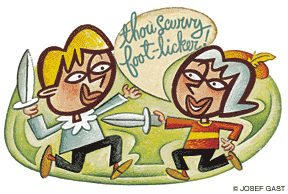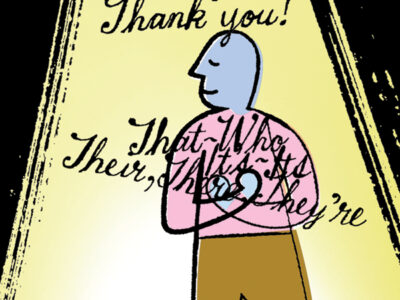
Act 1, Scene 1: A suburban elementary-school classroom 100 miles west of Verona. (Verona, New Jersey, that is.) One by one, the students stand up and hurl insults at their instructor, Diane Antonelli Herr CW’67 GEd’68.
Student 1: “Thou heartless, pigeon-livered maggot-pie!”
Student 2: “Thou scurvy, rump-fed foot-licker!”
Student 3: “Thou peevish, shag-eared rat-catcher!”
In most classrooms these epithets would ensure that the next scene takes place in the principal’s office. Herr welcomes insults, however—provided they are born of the Bard. She presents workshops at Philadelphia-area elementary schools to help kids become comfortable using the language of Shakespeare.
As with any other language, Herr believes that young children can learn Shakespeare with greater ease because they’re “superb mimics and so much less inhibited than when they get older.” If students are introduced to these works in a spirit of fun, she says, they will be less intimidated later on when they have to read an entire play.
After teaching Shakespeare for years to seventh, eighth, and ninth graders at Philadelphia’s Julia R. Masterman Laboratory and Demonstration School, Herr took an early retirement when her son was 5. (He’s now in fourth-grade). She asked his pre-school teacher at the time if she could come in and talk about Shakespeare—and was amazed at how the kids took to it.
In Herr’s Kid-Friendly Shake-speare workshops, kindergartners explore a model of the Globe Theatre. By second-grade, students are ready to dabble in the colorful language. Herr chooses Shakespearean insults that aren’t too suggestive and divides them into three columns consisting of single adjectives, compound adjectives, and nouns. “They have to pull one from each column, put thou in front of it, and insult me. I say to them: ‘This is the one time you can do that without getting in trouble.’” A favorite combination might be: “‘Thou puking, clay-brained hedge-pig.’ They love anything to do with puking,” Herr explains.
Older kids act out scenes from Romeo & Juliet and Midsummer Night’s Dream in the classroom. “I continue to be amazed at what these kids can do.”
When Herr asked for volunteers at Merion Elementary School to meet during two weeks of recess to rehearse for a Shakespeare festival last November, more than 100 fourth- and fifth-graders turned out.
To turn the production around quickly, sets were nixed and memorization of lines was made optional. The kids provided their own hats and funny outfits, if they had them. For a fight scene they used harmless inflatable swords, because schools are touchy these days about any potential weapons.
The final product, if not polished, was an imagination-sparking mix of comedy and tragedy. Three witches chanted incantations around a cauldron. Oberon tricked Titania after their lovers’ spat. Romeo and Juliet proclaimed their mutual longing.
When it was all over, the students inscribed a “Globe Theatre” autograph book with messages like the one below:
Dear Mrs. Herr:
I had so much fun being Tatania in the show. Giving up my recess was so worth it. Thanks a bunch.
Elizabeth
P.S. See you next year?
For a teacher who likes insults, that’s a pretty great compliment.
—Susan Frith




